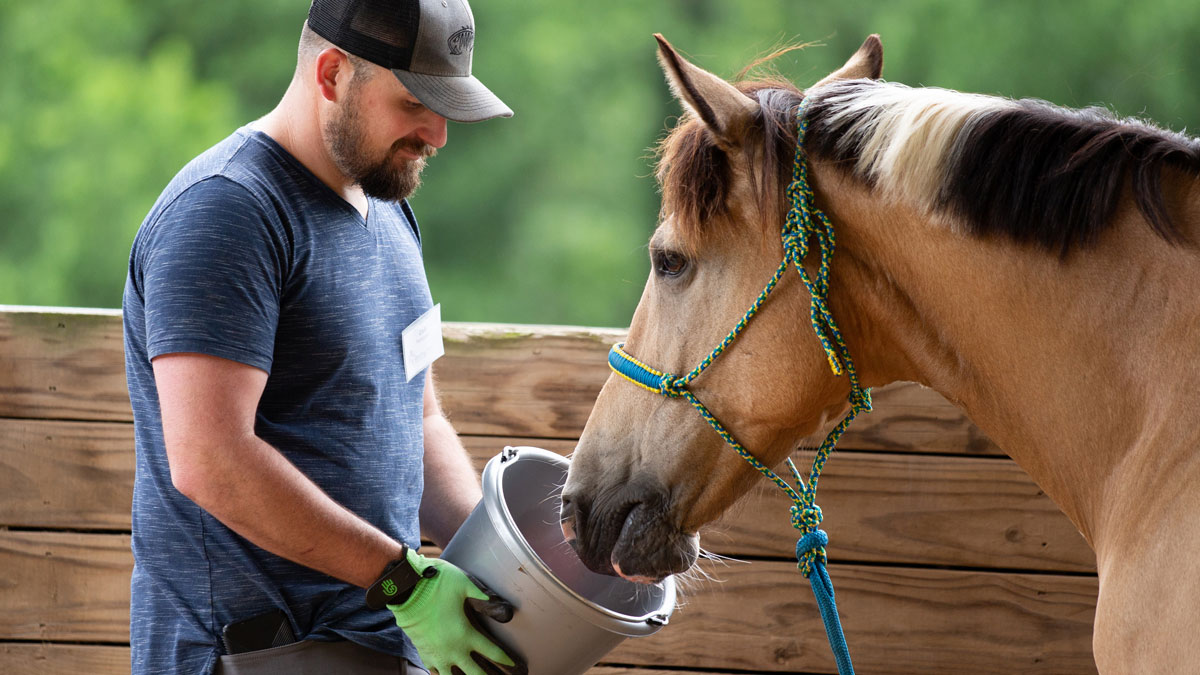As an animal lover, there is something about horses that seems different. Could it be their “gentle giant” demeanor? Or maybe the fact that many of them are considered “working” animals with actual jobs to do? Or is it the sense of identity people gain from caring for a horse?
Owning a horse is not for the faint of heart. These noble animals require a barn, space to run, grooming and feeding that a typical pet doesn’t hold a candle to. But the reward in companionship with a horse cannot be matched.
Horses truly “see” you. They have a strong emotional sense. If a person is angry, they shy away. If a person is scared or timid, they, too, feel scared. For these reasons, learning to care for a horse has become a prescribed therapy for many who are dealing with PTSD, addiction, depression or other forms of trauma, as well as for victims of abuse.
Equine-assisted therapy meets patients where they are. It allows them to have someone else to care for, someone else to hold them accountable for their actions and someone else to show them unconditional love.
“It is therapeutic to work with a horse. Everything from grooming to learning commands – it reduces stress just being around them,” said Diane Prewitt, owner and operator of Guiding Reins, an equine-assisted therapy program dedicated to improving the quality of life for veterans, first responders and others affected by emotional or mental challenges.
With a location in South Carolina’s Upstate and another in North Carolina, Prewitt said her dream became reality in the fall of 2019. For the five prior years, she had been researching how to use equine-assisted therapy to help a specific demographic of individuals. After receiving a grant that permitted her to accept clients, she opened a program that specifically focused on adults with military or first responder backgrounds.
“I just saw a need for this particular population of people,” she said. “I became passionate about treating their needs through equine-assisted therapy.”
Clients are referred to Guiding Reins by mental health professionals in North Carolina and South Carlina, but potential clients can contact Guiding Reins directly as well. The program is 16 weeks long, broken into once-a-week sessions. Through the grant Guiding Reins received, veterans are able to enroll in the program at no cost to them. As for others, Guiding Reins charges based on a sliding scale and offers scholarships to people such as frontline health care workers who have treated COVID-19 patients.
“This is much needed respite care for them,” said Prewitt. “They can come for the day or enroll in the entire program if needed.”
Clients learn basic horsemanship skills and how to groom the animals and may or may not ride them. They are matched with a specific horse, many of whom are rescues. Prewitt said that what is special about Guiding Reins is that its mission is really twofold – it helps individuals with emotional therapy and they rescue mistreated horses.
Prewitt said that she has found that the rescued horses are usually the best match for her clients because they can understand the hurt, neglect or pain the clients feel.
“They can identify with each other and connect on a deeper level,” she pointed out.
The client/horse relationship often becomes so strong that when the 16-week sessions are over, the clients have developed such a bond that they don’t want to leave Guiding Reins.
“We have created an ambassador program where former clients can volunteer to care for the horses in their spare time or partner with new clients coming into the program,” she explained. “It is a win-win for us. We do not have a shortage of volunteers to help out.”
Shortly after opening, Prewitt said Guiding Reins closed from March through May due to the COVID-19 pandemic. However, she knew it had to reopen to be there for clients who were suffering with depression.
Fortunately, everything takes place out of doors at Guiding Reins, where social distancing is practiced naturally because it’s difficult to be on a horse and be close to other people. Still, the program always has been about individuals caring for the horses, one person at a time. Prewitt said she keeps groups to just three clients, and a maximum of 10 people are permitted on the property at any given time.
As Prewitt has dealt with the changing landscape that COVID has laid out before us, she believes attaining her dream has been well worth the trouble.
“This is all about re-inventing yourself. It is never too late,” she said.
These majestic animals can teach us, test us and bring out the best in us. They are a combination of grace, beauty, fire and spirit, all wrapped into one amazing being. Maybe the late Pam Brown, an actress in the 1920s, said it best: “Horses lend us the wings we lack.”
In times of hardship, horses can teach us to fly.
For more information on Guiding Reins, visit guidingreins.org or call 864-457-3575.
By Theresa Stratford

